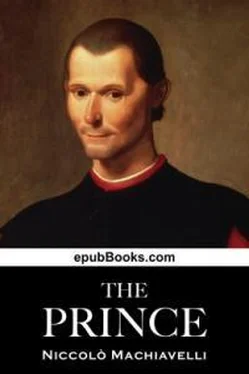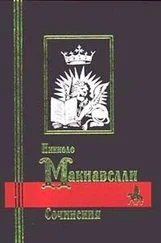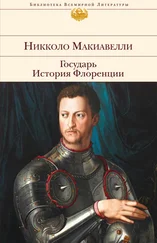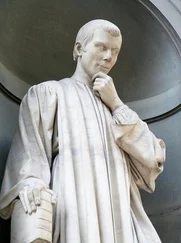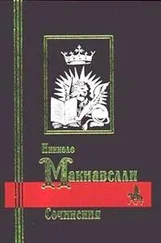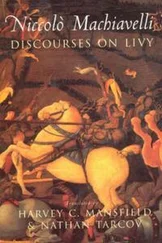Machiavelli's public life was largely occupied with events arising out of the ambitions of Pope Alexander VI and his son, Cesare Borgia, the Duke Valentino, and these characters fill a large space of "The Prince." Machiavelli never hesitates to cite the actions of the duke for the benefit of usurpers who wish to keep the states they have seized; he can, indeed, find no precepts to offer so good as the pattern of Cesare Borgia's conduct, insomuch that Cesare is acclaimed by some critics as the "hero" of "The Prince." Yet in "The Prince" the duke is in point of fact cited as a type of the man who rises on the fortune of others, and falls with them; who takes every course that might be expected from a prudent man but the course which will save him; who is prepared for all eventualities but the one which happens; and who, when all his abilities fail to carry him through, exclaims that it was not his fault, but an extraordinary and unforeseen fatality.
On the death of Pius III, in 1503, Machiavelli was sent to Rome to watch the election of his successor, and there he saw Cesare Borgia cheated into allowing the choice of the College to fall on Giuliano delle Rovere (Julius II), who was one of the cardinals that had most reason to fear the duke. Machiavelli, when commenting on this election, says that he who thinks new favours will cause great personages to forget old injuries deceives himself. Julius did not rest until he had ruined Cesare.
It was to Julius II that Machiavelli was sent in 1506, when that pontiff was commencing his enterprise against Bologna; which he brought to a successful issue, as he did many of his other adventures, owing chiefly to his impetuous character. It is in reference to Pope Julius that Machiavelli moralizes on the resemblance between Fortune and women, and concludes that it is the bold rather than the cautious man that will win and hold them both.
It is impossible to follow here the varying fortunes of the Italian states, which in 1507 were controlled by France, Spain, and Germany, with results that have lasted to our day; we are concerned with those events, and with the three great actors in them, so far only as they impinge on the personality of Machiavelli. He had several meetings with Louis XII of France, and his estimate of that monarch's character has already been alluded to. Machiavelli has painted Ferdinand of Aragon as the man who accomplished great things under the cloak of religion, but who in reality had no mercy, faith, humanity, or integrity; and who, had he allowed himself to be influenced by such motives, would have been ruined. The Emperor Maximilian was one of the most interesting men of the age, and his character has been drawn by many hands; but Machiavelli, who was an envoy at his court in 1507–8, reveals the secret of his many failures when he describes him as a secretive man, without force of character—ignoring the human agencies necessary to carry his schemes into effect, and never insisting on the fulfilment of his wishes.
The remaining years of Machiavelli's official career were filled with events arising out of the League of Cambrai, made in 1508 between the three great European powers already mentioned and the pope, with the object of crushing the Venetian Republic. This result was attained in the battle of Vaila, when Venice lost in one day all that she had won in eight hundred years. Florence had a difficult part to play during these events, complicated as they were by the feud which broke out between the pope and the French, because friendship with France had dictated the entire policy of the Republic. When, in 1511, Julius II finally formed the Holy League against France, and with the assistance of the Swiss drove the French out of Italy, Florence lay at the mercy of the Pope, and had to submit to his terms, one of which was that the Medici should be restored. The return of the Medici to Florence on 1st September 1512, and the consequent fall of the Republic, was the signal for the dismissal of Machiavelli and his friends, and thus put an end to his public career, for, as we have seen, he died without regaining office.
Literature and Death
Aet. 43-58―1512-27
On the return of the Medici, Machiavelli, who for a few weeks had vainly hoped to retain his office under the new masters of Florence, was dismissed by decree dated 7th November 1512. Shortly after this he was accused of complicity in an abortive conspiracy against the Medici, imprisoned, and put to the question by torture. The new Medicean pope, Leo X, procured his release, and he retired to his small property at San Casciano, near Florence, where he devoted himself to literature. In a letter to Francesco Vettori, dated 13th December 1513, he has left a very interesting description of his life at this period, which elucidates his methods and his motives in writing "The Prince." After describing his daily occupations with his family and neighbours, he writes: "The evening being come, I return home and go to my study; at the entrance I pull off my peasant–clothes, covered with dust and dirt, and put on my noble court dress, and thus becomingly re–clothed I pass into the ancient courts of the men of old, where, being lovingly received by them, I am fed with that food which is mine alone; where I do not hesitate to speak with them, and to ask for the reason of their actions, and they in their benignity answer me; and for four hours I feel no weariness, I forget every trouble, poverty does not dismay, death does not terrify me; I am possessed entirely by those great men. And because Dante says:
Knowledge doth come of learning well retained,
Unfruitful else,
I have noted down what I have gained from their conversation, and have composed a small work on 'Principalities,' where I pour myself out as fully as I can in meditation on the subject, discussing what a principality is, what kinds there are, how they can be acquired, how they can be kept, why they are lost: and if any of my fancies ever pleased you, this ought not to displease you: and to a prince, especially to a new one, it should be welcome: therefore I dedicate it to his Magnificence Giuliano. Filippo Casavecchio has seen it; he will be able to tell you what is in it, and of the discourses I have had with him; nevertheless, I am still enriching and polishing it."
The "little book" suffered many vicissitudes before attaining the form in which it has reached us. Various mental influences were at work during its composition; its title and patron were changed; and for some unknown reason it was finally dedicated to Lorenzo de' Medici. Although Machiavelli discussed with Casavecchio whether it should be sent or presented in person to the patron, there is no evidence that Lorenzo ever received or even read it: he certainly never gave Machiavelli any employment. Although it was plagiarized during Machiavelli's lifetime, "The Prince" was never published by him, and its text is still disputable.
Machiavelli concludes his letter to Vettori thus: "And as to this little thing [his book], when it has been read it will be seen that during the fifteen years I have given to the study of statecraft I have neither slept nor idled; and men ought ever to desire to be served by one who has reaped experience at the expense of others. And of my loyalty none could doubt, because having always kept faith I could not now learn how to break it; for he who has been faithful and honest, as I have, cannot change his nature; and my poverty is a witness to my honesty."
Before Machiavelli had got "The Prince" off his hands he commenced his "Discourse on the First Decade of Titus Livius," which should be read concurrently with "The Prince." These and several minor works occupied him until the year 1518, when he accepted a small commission to look after the affairs of some Florentine merchants at Genoa. In 1519 the Medicean rulers of Florence granted a few political concessions to her citizens, and Machiavelli with others was consulted upon a new constitution under which the Great Council was to be restored; but on one pretext or another it was not promulgated.
Читать дальше
